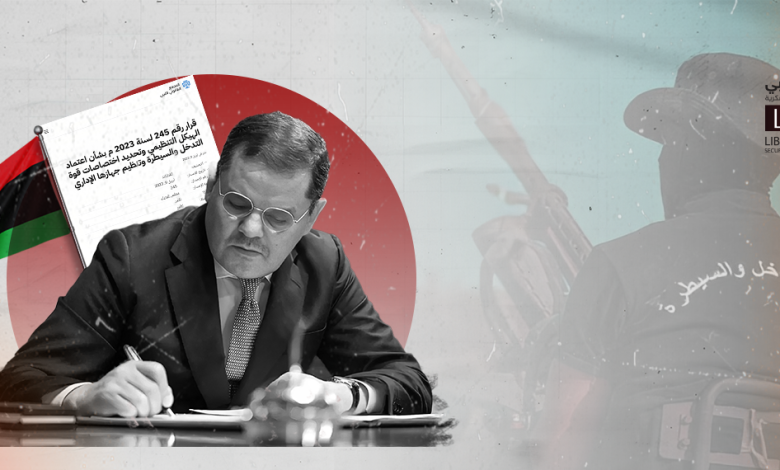The decision to establish the intervention and control force: motives and dimensions

Preface..
Local Libyan media recently circulated Resolution No. (245/2023), And issued by the Council of Ministers of the Government of National Unity, Marked by the signature of its president, Engineer “Abdul Hamid Al-Dabiba “, Concerning approving the organizational structure and defining the terms of reference of the “intervention and control force”, organization of its administrative apparatus, It is noteworthy that the date of this decision dates back to April 9, 2023. However, it was not published or circulated.
This decision came in ten papers. It dealt with the organizational structure of the force, its terms of reference, which came in 17 paragraphs, As stated in the first paragraph ” The intervention and control force undertakes the implementation of legislation, regulations, decisions, and the necessary measures and procedures that guarantee the security of the country and the protection of lives, honor and property, and implements the plans, policies, and programs necessary to implement legislation in the field of combating crime, maintaining public order, and combating criminal gangs that practice organized crime in smuggling, drug trafficking, weapons, fuel, and theft. “.
In the rest of the paragraphs, specializations varied between administrative and judicial control. intelligence work, guarding and securing ports, borders and coasts, The resolution also dealt with the tasks of the force commander, including representing the force at home and abroad. The organizational structure of the force included a department under the name of the Department of Security Affairs. And assigned to this department a set of competencies, including: ” Implementing proactive operations to thwart any criminal or sabotage operations. As well as monitoring and following up hostile and suspicious activities that endanger the political and administrative entity of public institutions“.
In this decision, it is possible to note the expansion of the terms of reference of this force. This gives it broad powers that overlap with the original competences of the Ministry of Interior and its departments. As well as the terms of reference of the Libyan intelligence community, Which consists of the General Intelligence Service, Internal Security and Military Intelligence, It is also noteworthy here, That the description of who will be at the head of the force is “commander,” and the decision did not use the capacity of director or chief. What makes the force an entity that combines the characteristics and powers between defense, security and intelligence.
Perhaps the most important question that imposes itself here is , What is the real motive for the “Abdul Hamid Al-Dabiba ” government to establish this force? What is the significance of timing?
It is no secret to those who follow the political and security scene in Libya the state of political rivalry between political and security actors, which often developed into armed confrontations that differed in intensity. Likewise, the issue of changing allegiances with regard to security and military leaders.
This leads to a sudden change in the balance of power among the political parties. Which may lead to a decline in influence and control.
It seems that this matter has prompted “Abdul Hamid Al-Dabiba ” to search for a mechanism that guarantees him strategic allies that he creates through the legitimacy he gives them and budgets under his control.
In the same context, information has circulated about the establishment of Major General “Osama Al-Juwaili”, after the leaders, Ayoub Aburas, joined him. Haitham Al-Tajouri, With preparations that are feared to be directed towards the capital, Perhaps this is what prompted Abd al-Hamid Al-Dabiba to seriously think about securing his stay in power. whose challenges are increasing day by day.
Conclusion ..
The establishment of entities of this kind paramilitary parallel to the official security and military institutions of the state, is considered extremely dangerous, It represents a major challenge to the security and stability of the country. Rather, the entity of the state and its national security, Especially since Libya considers the democratic experience in it to be still recent. This is for several reasons, perhaps the most important of which are the following:
- The problem of the dual state : the establishment of strong paramilitary entities, It is granted broad powers. parallel to the official security and military institutions, means that these entities will act as a “parallel state” within the state, This will weaken the prestige and authority of the official security and military institutions of the state. and diminishes their ability to enforce the law and maintain public order.
- A real threat to national security : These paramilitary entities may turn into a threat to national security if they are exploited to achieve political agendas that conflict with the supreme interest of the state. Especially within the state of confusion among Libyans between the state as an independent legal and political entity, between the ruling political authority, This increases the chances of falling into internal conflicts and the spread of systematic violence.
- Lack of accountability : These entities often operate outside the scope of the laws and legislation stipulated for the official security and military institutions in the country. The influence of these entities makes them not subject to the standards of transparency and accountability. This can lead to the violation of human rights, the abuse of power and the further enrichment of these entities and their leaders.
- Constitute a threat to the democratic experience : the presence of these entities may be an obstacle to the development of democracy in the country. which may lead to the undermining of formal democratic institutions, And disrupting the process of transferring power and negotiating it in a peaceful and legitimate manner.
- Promoting internal conflicts and divisions : the existence of these entities can lead to an escalation of internal conflicts and divisions in society. Where these entities can be centered around specific interests or religious or political groups, Which leads to the division of society and destabilization.
and that’s all, contradicts the philosophy of the existence of the security establishment, whose duty is to maintain public safety and community peace, Rather, the police are looking for societies in which the democratic experience is well-established. To the independence of the police in operational, technical and procedural terms from the executive authority.
Finally The Libyan state, in which the democratic experience is considered recent, must focus on strengthening the strength and independence of the official security, police and military institutions, and ensure their access to internationally recognized vocational training. It should also promote a culture of democracy and the rule of law and encourage civil participation and constructive dialogue to contribute to achieving community stability and strengthening social peace, and avoid expanding the establishment of parallel security and military entities that pose a real threat to the future of the state and its entity.
The state must also focus on realizing the concept of “civil-military administration”. To help restore order and stability to the state, Achieving the concept of community security and safety for citizens and institutions, It also helps effectively in rebuilding the security and military institutions on the basis of an internationally agreed upon methodology. And linked to the laws and legislative texts in force in the country.
To download the file, click here
Source


